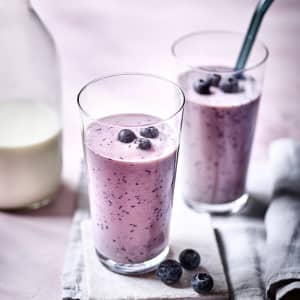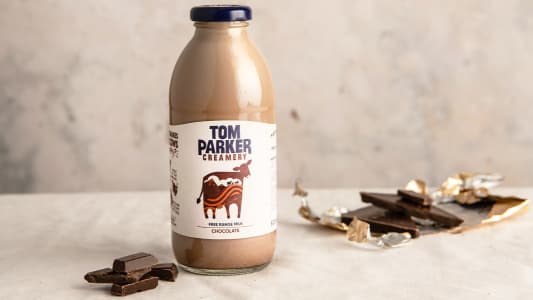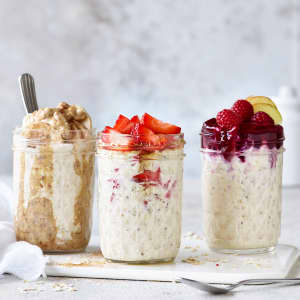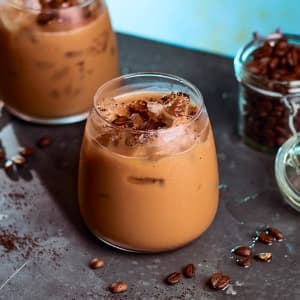How to Choose the Best Milk Alternative for You
Finding the best milk alternative largely depends on what you’ll be using it for, as each one has a unique taste and texture. Some are sweeter, so better for coffees and baking, whereas other options are more suited to savoury dishes.
So, whether you’re looking for the best one to enjoy with your morning cereal or want to find one with a high protein content - these are some of the most popular dairy-free kinds of milk to choose from.
Oat
When it comes to cow’s milk alternatives, oat milk has really been having its moment - and it’s not hard to see why when you consider its amazing versatility.
The creamy texture and neutral taste makes it a popular choice among coffee drinkers, as well as the fact that it froths easily - which can’t be said for all plant milks.
When it comes to nutrition, oat milk is low in fat, contains soluble fibre and is often fortified with a number of vitamins and minerals such as vitamin D, B12, A and calcium.
As many brands are naturally dairy, nut and soy free, it’s ideal for those with specific dietary requirements, however, those who avoid gluten will need to make sure they purchase specific gluten-free oat milk.
Almond
Almond milk is another popular alternative to cow’s milk. With a delicate nutty flavour, light texture and coming in both sweetened and unsweetened varieties, it makes a great substitution for dairy milk.
Unsweetened almond milk is relatively low in calories, fat and carbs, making it a popular ally for those counting their macros or calories.
When it comes to the nutritional value, almond milk is similar to other alternatives in that it is often fortified with a range of vitamins and minerals such as calcium, vitamin D and B12, however, it is naturally rich in the fat-soluble vitamin E.
Although almond milk is the ideal alternative for those looking to avoid dairy, soya or oats, it is not suitable for people who are unable to consume tree nuts.
Coconut
Coconut milk (the kind you get in a carton, not a tin) will bring a taste of the tropics to your daily routine with its creamy texture and subtly sweet, exotic flavour. Whether you stir it into your morning coffee, add a refreshing twist to your overnight oats or use it to make a creamy curry sauce, this dairy alternative is a game-changer in the kitchen.
In terms of nutrition, it is very low in protein and higher in saturated fat than some other alternatives, so may not be suitable for everyone. However, as unsweetened coconut milk is low in carbs, it is a popular choice for those on a low-carb, high-fat diet.
It is also ideal for people looking to avoid dairy and nut or soy-based alternatives, however, it isn’t suitable for those who need to avoid tree nuts.
Soya
Soya milk has long been a staple in the world of dairy alternatives, celebrated for its smooth, creamy texture and mild flavour that works well in everything from frothy coffee to savoury dishes. Its versatility makes it a go-to choice for those seeking a plant-based option that doesn’t compromise on taste or functionality.
What makes soya milk stand out is that it is a ‘complete’ protein source, meaning it contains all nine essential amino acids.
Additionally, with around three grams of protein per 100ml, it is the closest to cow’s milk in terms of protein content. Additionally, like other milk alternatives, it’s also often fortified with essential vitamins and minerals like calcium, vitamin D and B12 to help contribute to a balanced diet.
Hemp
Hemp milk is a plant-based alternative made from hemp seeds. Known for its earthy, slightly nutty flavour and creamy texture, it’s a versatile option that works well in coffee, smoothies and savoury recipes.
What sets hemp milk apart is its impressive nutrient profile. It’s naturally rich in omega-3 and omega-6 fatty acids, which are thought to help support heart and brain health. Like soy, it is also a complete protein but only contains a small amount per serving, so may not be suitable for those looking for the highest protein milk alternative.
Hemp milk is a great choice for those with specific dietary requirements, as it’s naturally free from dairy, nuts, soy, and gluten. The production process also makes it a more sustainable option for environmentally-conscious consumers.
Rice
Made from milled rice and water, rice milk is known for its naturally-sweet flavour and light, thin texture, it’s ideal for pouring over cereal, adding to smoothies and coffee and its subtle sweetness blends easily without overpowering other flavours.
It also works well in baking, adding a delicate flavour to cakes, muffins and pancakes, though it’s not as creamy as other alternatives like coconut or soy milk.
Rice milk is a popular choice for those seeking a dairy-free option that’s gentle on the palate and suits various dietary requirements. Although it’s naturally low in fat, it also has a much lower protein content than other alternatives. However, it is thought to be easier to digest and is also a great choice for those with specific dietary requirements as most varieties are free from dairy, soya, nuts and gluten.
Pea
Looking for a plant-based milk that’s creamy, packed with protein and super versatile? Say ‘hello’ to pea milk!
Made from yellow split-peas, this dairy-free option has similar taste and consistency to cow’s milk, which makes it a popular replacement for everything, from your morning brew to your favourite cereal.
What makes pea milk stand out against other plant-based alternatives is its high protein content, providing around two grams per 100ml. Plus, it’s often fortified with calcium, vitamin D and B12 to help contribute to a healthy, balanced diet.
As well as being fairly low in calories, fat and carbohydrates, most varieties are free from dairy, soy, and nuts, making it ideal for people with specific dietary needs.
Hazelnut
If you're craving plant-based milk with a rich, nutty flavour then hazelnut milk might just be your new go-to. With its smooth texture and naturally sweet taste, it’s perfect for everything from hot chocolate to pouring over your morning granola or adding to your favourite baked goods.
What makes hazelnut milk stand out is its delicious flavour, which adds a unique twist to your usual plant-based milk options. It’s also packed with healthy fats, vitamins and minerals, including vitamin E, which can help support healthy skin. Many varieties are fortified with calcium, vitamin D and B12, giving you a nutritional boost.
Many brands are naturally free from dairy and soy, making hazelnut milk a great choice for those with specific dietary requirements (unless you can’t consume nuts!). Whether you're sipping it straight or using it in your favourite recipes, it’s a tasty and versatile dairy-free option.
Potato
Who would’ve thought potatoes could do more than just make fries and mash? Enter potato milk, the creamy, mild-flavoured plant-based milk that’s here to surprise you and works wonders in everything from your morning brew to baking.
What makes this alternative milk stand out is its light yet creamy texture, thanks to the natural starches in potatoes, which help give it that rich consistency – ideal for those who want a milk that’s smooth but not too heavy.
It’s also naturally low in fat and high in potassium and many varieties are fortified with calcium, vitamin D, and B12 to mimic the effects of traditional dairy products and boost your nutrition.
Free from dairy, soy and nuts, potato milk is a great choice for those with specific dietary requirements.
Discover Your New Favourite Dairy-Free Alternative!
Whether you're making the creamiest coffee, blending a smoothie or just enjoying a bowl of granola, there's a dairy-free alternative for every moment.
And with Milk & More, you can have your favourites delivered straight to your door, making those good mornings even better – no matter what your dietary needs are. So explore our range of dairy alternatives today and see how easy it is to incorporate them into your diet.






